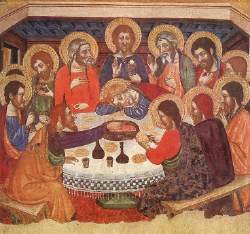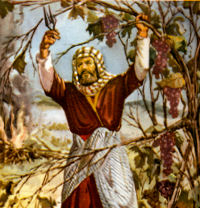» Enjoy our Liturgical Seasons series of e-books!
"I give you a new commandment: love one another; just as I have loved you, you also must love one another. By this love you have for one another, everyone will know that you are my disciples."
Love is man's first and constant vocation. Love is the summary of the whole Bible. Love is the secret of the saints, the necessary way to God. It is the means to reveal God's heart to other men. But the beauty of God's love must show itself fresh and new in every Christian; for beauty, to delight and attract, must be fresh as the morning. Every deed of vital love, performed by us in our personality which nature and grace have fashioned, is like the morning of time itself. "God is love" in its mysterious fullness and infinite freshness. Utterly King and Lord, He unites the baptized of every nation in the one Mystical Body of Christ, by the one Holy Spirit, under the one Mother Mary.
Sunday Readings
The first reading is taken from Acts 14:21-27. Last week we heard of St. Paul's experiences at Antioch in Piscidia during his first missionary journey. Their visit had ended on a sour note as Paul and Barnabas were expelled. The reading ended with"the two shook the dust from their feet in protest and went on to Iconium. Their disciples knew only how to be filled with joy and the Holy Spirit". Today we hear of the conclusion of this first missionary journey where Paul and Barnabas retrace their steps back through Antioch in Piscidia on their way back to Antioch in Syria where they had begun their journey. The second reading is from the Book of Revelation 21:1-5a. For the past three weeks we have had as our second reading an account of John's privileged vision of the heavenly liturgy where he has seen the eternal sacrifice being offered to God the Father by His Son, The New and Eternal High priest and sacrifice. We have heard also the prayers being offered by the faithful. We now go to the end of John's account as he describes the Heavenly Jerusalem. It was Jesus' mission to go to the earthly Jerusalem to offer His sacrifice — this shows us the path that we must follow to reach the Heavenly Jerusalem so that we can dwell with Him there forever.
 The Gospel is from John 13:31-33a, 34-35. The time of this reading is at the last supper just after Jesus has predicted His betrayal and prior to their leaving for Gethsemane. After announcing that he is leaving them, Christ summarizes his commandments in one — the New Commandment. He will repeat it a number of times during the discourse of the Supper, and St John in his first letter will insist on the need to practice this commandment of the Lord and on the demands it implies. Love of neighbor was already commanded in the Old Testament — and Jesus ratified this when he specified that it was the second precept of the whole Law and similar to the first: Love God with all your heart and soul and mind. But Jesus gives the precept of brotherly love new meaning and content by saying "even as I have loved you". The love of neighbor called for by the Old Law did also in some way extend to one's enemies; however, the love which Jesus preaches is much more demanding and includes returning good for evil, because Christian love is measured not by man's heart but by the heart of Christ, who gives up his life on the Cross to redeem all men. Here lies the novelty of Jesus' teaching, and our Lord can rightly say that it is his commandment, the principal clause in his last will and testament.
The Gospel is from John 13:31-33a, 34-35. The time of this reading is at the last supper just after Jesus has predicted His betrayal and prior to their leaving for Gethsemane. After announcing that he is leaving them, Christ summarizes his commandments in one — the New Commandment. He will repeat it a number of times during the discourse of the Supper, and St John in his first letter will insist on the need to practice this commandment of the Lord and on the demands it implies. Love of neighbor was already commanded in the Old Testament — and Jesus ratified this when he specified that it was the second precept of the whole Law and similar to the first: Love God with all your heart and soul and mind. But Jesus gives the precept of brotherly love new meaning and content by saying "even as I have loved you". The love of neighbor called for by the Old Law did also in some way extend to one's enemies; however, the love which Jesus preaches is much more demanding and includes returning good for evil, because Christian love is measured not by man's heart but by the heart of Christ, who gives up his life on the Cross to redeem all men. Here lies the novelty of Jesus' teaching, and our Lord can rightly say that it is his commandment, the principal clause in his last will and testament.
Love of neighbor cannot be separated from love of God: "The greatest commandment of the law is to love God with one's whole heart and one's neighbor as oneself. Christ has made this love of neighbor his personal commandment and has enriched it with a new meaning when he willed himself, along with his brothers, to be the object of this charity, saying: 'As you did it to one of the least of these my brethren, you did it to me'. In assuming human nature he has united to himself all humanity in a supernatural solidarity which makes of it one single family. He has made charity the distinguishing mark of his disciples, in the words: 'By this all men will know that you are my disciples, if you have love for one another"' (Vatican II, Apostolicam actuositatem, 8).
Even though Christ is purity itself, and temperance and humility, he does not, however, make any one of these virtues the distinguishing marks of his disciples: he makes charity that mark. "The Master's message and example are clear and precise. He confirmed his teaching with deeds. Yet I have often thought that, after twenty centuries, it is indeed still a new commandment, for very few people have taken the trouble to practice it. The others, the majority of men, both in the past and still today, have chosen to ignore it. Their selfishness has led them to the conclusion: 'Why should I complicate my life? I have more than enough to do just looking after myself.'
"Such an attitude is not good enough for us Christians. If we profess the same faith and are really eager to follow in the clear footprints left by Christ when he walked on this earth, we cannot be content merely with avoiding doing unto others the evil that we would not have them do unto us. That is a lot, but it is still very little when we consider that our love is to be measured in terms of Jesus' own conduct. Besides, he does not give us this standard as a distant target, as a crowning point of a whole lifetime of struggle. It is — it ought to be, I repeat, so that you may turn it into specific resolutions — our starting point, for our Lord presents it as a sign of Christianity: 'By this shall all men known that you are my disciples'" (J. Escriva, Friends of God, 223).
And this is what in fact happened among Christians in the early centuries in the midst of pagan society, so much so that Tertullian, writing around the end of the second century, reported that people could indeed say, looking at the way these Christians lived: "See how they love one another" (Apologeticum, XXXIX). — The Navarre Bible - St. John
Things to Do:
- Take your mother out to dinner for Mother's Day. Make a special dessert to celebrate Mom's day.
- Honor Mary in a special way on Mother's Day since she is the Mother of us all. (For Mom's only: If you are feeling at all neglected, concentrate on it being a day to honor Our Lady instead of yourself. You will find that you then appreciate anything that may be done for you today.)








